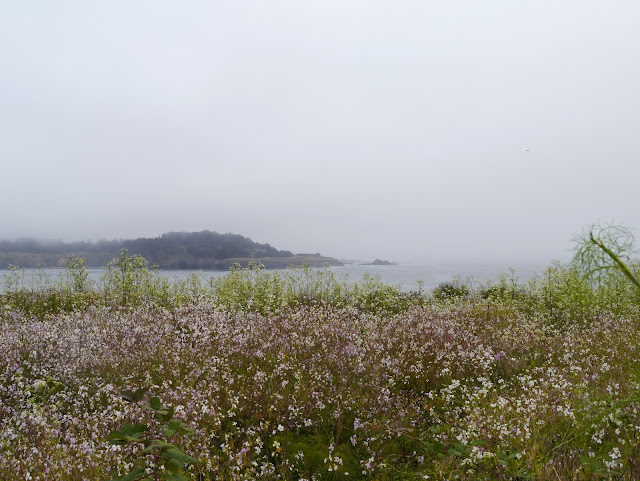There is a language the world speaks, and I think I have been listening for it my whole life. For a long time I thought it was only something that existed in the fantasy novels so beloved to me as a girl, where women spoke with birds and knew the whisperings of plants and the medicine they carried. But I know it for something real now, of this world, the one I live in, the one my body moves through every day and every starry night, the one that feeds and sustains me in every way. I know it for something we humans once knew how to understand, and still can. I know that the books I read as a girl preserved, under the guise of magic, what all of our ancestors knew, if you follow the rivers of your blood back far enough.
Now, the voice of the thrush in the hazel tree, the spotted towhee rooting in the huckleberry, the patterns left by kelp on the shore, have started to become deeply familiar. Kin, and beloved. I do not know what they are saying, but I know that what they are speaking, and that their meaning is one of the most precious things in this world.
One day last month while on the Mendocino coast for a family reunion, where my father's family is from back to the 1860's, I stopped in my tracks on the seashore. The tide had washed up a collection of words. In wave-wracked kelp and mussel and crab and bone I saw them. Ocean runes whose meaning I did not know, but whose shape I recognized for something oracular, something spoken by the sea.
Looking around I began to see words everywhere. In lines cut by time and pressure in sedimentary rock. In the tide-cast of driftwood, like the yarrow stalks of the ancient I Ching.
Every time the waves rushed up the shore, indigo and bracing with the summertime California Current, they cast the runes anew. Battered kelp stalks crissed and crossed with the skull of a gull into fresh patterns. I was transfixed. In me an old woman stirred; the old woman who knows the reading of such things, and always has.
So often we humans think of the idea of divination as a communication that only concerns our own lives. A question about health, a relationship, a career choice.
But as I watched the tide move in and out I was struck by a wholly different possibility. That originally, oracles like those who prophesied by the rustling leaves of the oaks of Dodona, were translating a non-human language into human terms; that what it said was not about our affairs at all, but rather about our relationship to the oak, to the wooddove, to the mountain or the sea, and theirs to earth herself.
I began to suspect that those old sibyls were attuned to what the ocean or the oak said, on their own terms. Kings might come and ask about the fates of wars, and the sibyls did their best to prophecy them, but what the tidal runes speak of is not the destiny of men but the destiny of oceans, and the lives of kelp and sea snail, seal, oystercatcher, bladderwrack and loon.
That a word written in driftwood, shell and kelp-stalk is as old as time, and alive; a saltmade rune that is a doorway into other worlds, the ones that live mostly deeply within this world, just beyond our normal sight.
Gutted sandcrab, moonbead of jellyfish, cross of saltgrass, stone and dulse, green moss marbles and coiled calligraphy of rotting kelp; what word does the solstice tide spell through you, cast upon the shore?
I think it is a lifetime's work, to understand the first word of such incantations.
But simply to be on the lookout for them is its own pleasure and beginning; to rest your eyes on patterns made by wave and time and wind, and know that they are slow and ancient words spoken in the many tongues of the living world, more unhindered and alive than any words we have ever known.
Words that abalones carry under their pink-bound shells; words that urchins chant over and again from their secret orange navels; words that carry all the holy strangeness of this earth, where looking into the low tide pools of the summer solstice while gathering seaweed is to scry another world, where all of precious life on earth began.

It is no secret. All power is one in source and end, I think. Years and distances, stars and candles, water and wind and wizardry, the craft in a man's hand and the wisdom in a tree's root: they all arise together. My name, and yours, and the true name of the sun, or a spring of water, or an unborn child, all are syllables of the great word that is very slowly spoken by the shining of the stars. There is no other power. No other name.
- Ursula K. Le Guin, from A Wizard of Earthsea
Cast out, little brindled snail, upon the slicklands of the tidal kombu; may your way be well and fathomless. May we bend our heads to watch the words you leave behind in your iridescent wake, and in that bending, pray.








































